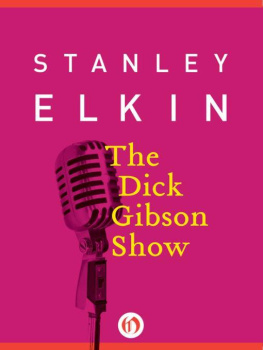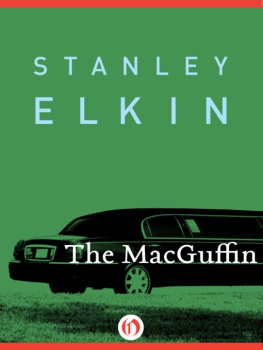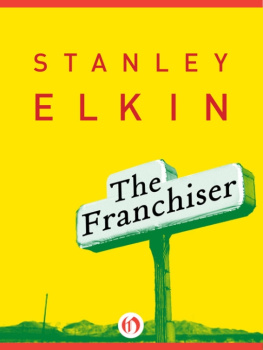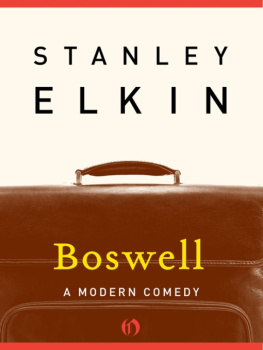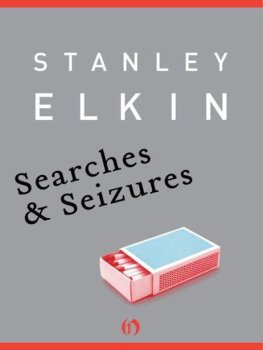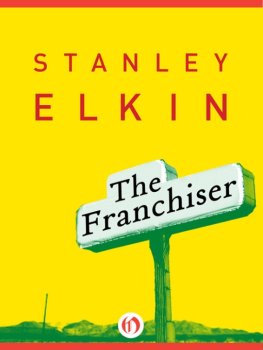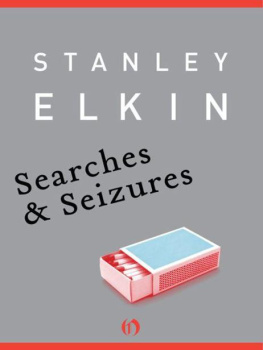The Dick Gibson Show
Stanley Elkin

Contents
To
Jack Eigen: WMAQ
Jerry Williams: WBZ
Long John Nebel: WNBC
Joe Gearing: WJAS
Bill Barker: KOA
Ira Blue: KFRC
Jean Shepherd: WOR
Barry Gray: WMCA
Jack McKinney: WCAU
Joan Elkin: WIFE
I would like to thank the Rockefeller Foundation
for its generous financial assistance
while I was writing this novel.
VITA; DICKS LOG:
When Dick Gibson was a little boy he was not Dick Gibson. And he could get Omaha, could get Detroit, could get Memphis; New Orleans he could get. And onceit was not a particularly clear or cold night; for that matter it may even have rained earlierhe got Seattle, Washington. He listened almost until sign-off, hoping that the staff announcer would say something about the wattage put out by the station. Then, after the midnight news but before the amen of the sermonette, the station faded irrecoverably. Hed learned never to fool with the dial, that it did no good when a signal waned to reclaim it with some careful, surgical twist a half-dozen kilocycles to the right or left. It was best to wait through the babble and static for the return of the electronic tide. Often it would come, renewed for its hiatus, its cosmic romp and drift, strongly present again after its mysterious trip to the universe. This time it didnt.
He did not hear that particular station again until he was a part-time staff announcer in Butte, Montana, a kid who in those daysit was his first jobliked to doll up his speech and introduce into its already bygone mid-Atlantic baseTex Ellery he called himselfsome heroic mans man drawl, a quality of bright bandanna, checked wool shirt and sheepskin coata crackling, youthful noise, courteous and maaming, but cautious and deceptively slow in another, knowing register: last to draw, first to shoot. He had not yet learned the good announcers trick of distance, his way with a mile, the sense he gave of the alien, of the Southerner come north, the Northerner dropped south, sliding subtly into regionalism only during the commercial, not presuming to presume to direct, but doing all commanding and urging and wheedling in a sort of moral blackface, deferentially one of them only when the chips were down and money passed.
He heard the station again in Butte, Montana. He was sitting miles out, in the transmitter shack where he sometimes doubled as engineer. He had just done his sleepy duty to the dials he did not really understand, uncertainly monitored the audio frequencies and seen to their many-trillioned amplification. (He did not read the figures themselves, merely the dangerous red margins of the curving dial faces, looking out for the insufficiencies implicit in the needles steep ascent, the surfeits of their fearful plunges at the other end, alarmed only for their throes, engaged by extremes and compensating by reactions, reining in and pouring it on by turns.) It was a quiet night in an early stormless spring, the stars distinct, the sun spotless. The needles floated easily in their white calm, and he listened to the radio he had brought with him. The other, a speaker permanently tuned to the Butte station, softly played a transcription of dance music. Rotely he turned the dial of his radio, a little bored, too familiar with what he could expect to bring in here, when suddenly, and as clearly as if it were a local station, he heard the old Seattle call letters and remembered at once the evening he had first heard them in bed. Strangely, though he was thousands of miles closer to Seattle than he had been when he had first heard its signal all those years before, the city seemed just as distant, the intervening planes of time undiminished, all imaginations vast, seamless landscapes still between. Excitedly he entered the stations call letters and wave length in the logbook he kept. He listened for the announcers name and entered that, together with a brief description of the nature of the program. The log, a ringed, black leather looseleaf notebook, was thick with the entries he had made over the years. Arranged alphabetically according to their call letters, the designations seemed more like words to him than sounds or names, the harsh, often vowelless K calls and softer W calls and C for Canada calls and stations in Mexico beginning with X like the difficult names of Aztec gods.
When he had made his entry he was momentarily distracted by the low sounds coming out of the speaker mounted above his desk. The music was still playing, but he thought he detected a shift, a sudden soprano sharpness in the mix. He looked nervously at the dials but saw that all the needles still treaded easily in the safe middle depths of their dial faces. He turned up the volume on the speaker and listened. He had a sensitive ear, for the sound of radio some sort of unmusical perfect pitch, and he was certain that the tone quality had changed. Yet the dials, consulted again, registered nothing wrong; as blandly steady as some Greenwich constant, they signified an almost textbook energy. He turned off his radio and tilted his head judiciously toward the sounds that came from the speaker. He looked at the telephone that connected him on a direct line to his station, certain it would ring. Checking the dials a third timethe sound had thickened now, exactly, it occurred to him, like the signal of a station just before it fadeshe decided that the trouble must be in the transcription itself.
He picked up the phone. The studio engineer was already on it. Whats going on? the man asked.
Its got to be in the transcription. The dials show Im putting out everything Im receiving. Get Markham to make an announcement.
Markhams out, the engineer told him. The transcription was supposed to run for a half hour. Im the only one here.
Well, put on something else. It sounds awful.
I know. Look, use the standby mike. Ill cut you in from the shack. Open your mike in thirty seconds. Ill have to duck out to the music library and get something. Can you talk for a few minutes?
Ill say some thing.
He replaced the receiver and rushed to the microphone. It was an ancient thing from the earliest days of broadcasting, an enormous iron web used now only for emergencies, calming alarm at alarms source with messages of contingency deflected and the handled untoward. It shattered the sudden or extended silences with the hearty good cheer and sweet reason of all backstage coping, by that fact creating a sense of the real silence held off, engaged elsewhere: nothing to worry about while the auxiliary microphone still burned and the staff still lived. The bulletins of reassurancePLEASE STAND BY; ONE MOMENT PLEASE!showing that emergency could still be courteous, disaster graceful-spirited. He had first heard them as a child, thrilling to their lesson that help was available. When the film tore or the lines went down there were always calm men to give these signals. In a way, it was what had attracted him to radio: the steady steady-as-she-goes pep talk of trouble shooters who routinized the extraordinary.
He counted to ten and opened his microphone. He heard the needle arm tear across the surface of the transcription, leaving the mounted speaker not dead but crepitant, the mike still open at the station broadcasting the void itself now, amplifying the bristling snap and hiss of the universe. Please stand by, he announced. But he had forgotten to turn down the speaker and heard his voice bounce back at him, enormous and delayed by a fraction of a fraction of a second. He became confused. One moment please, he begged, and again the two voicesthe one in his mouth that all his life he would stand behind, his sound but always sent away, forever sacrificed, and the one booming from the speakerseemed to collide fiercely in midair. It was a phenomenon he had experienced at the studio whenever someone had carelessly left open the door to the engineers booth, and he knew it could combust in a sudden piercing feedback. But something about the shacks isolation, the idea of his ricocheting voice, its far-flung ventriloquous roundtrip, was exciting to him. Although he still expected momentarily to ignite a shriek as the two voices sparked each other, he began to speak.
Next page
